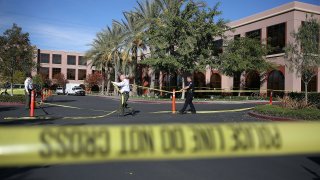
A 29-year-old Southern California man was sentenced Friday to 20 years in prison for his role in the 2015 San Bernardino terrorist attack that killed 14 people.
Enrique Marquez Jr. pleaded guilty in February 2017 to one count each of providing material support to terrorists and making false statements in the acquisition of firearms. In exchange for his admissions, the U.S. Attorney's Office dropped related charges of marriage fraud, immigration visa fraud and lying on a federal document.
Marquez repudiated his plea two years later, culminating in a series of hearings involving defense attorney John Aquilina, in which he argued that his client had reflexively entered the plea over feelings of sorrow stemming from the massacre at the Inland Regional Center in San Bernardino.
In January, Aquilina requested that the plea be voided. However, U.S. District Judge Jesus Bernal ultimately rejected the motion and ordered the sentencing to move forward at U.S. District Court in Riverside.
It has been postponed several times.
“This defendant was an active member of a conspiracy that planned to inflict death and destruction on innocent people,” said First Assistant United States Attorney Tracy Wilkison. “Today’s sentence is the direct result of actions that enabled a terrorist and laid the foundation for an attack that took 14 innocent lives, wounded 22 others, and shook the entire nation.
"By his own admissions, this defendant collaborated with and purchased weapons for a man he definitively knew held radical and anti-American beliefs – and who wanted to kill innocent people.”
U.S. & World
Aquilina's brief was unavailable, but portions of it were included in the government's narrative, which indicated that the defense believes mitigating factors include Marquez's lack of actual hands-on involvement in either the planning or execution of the terrorist attack. The defense also characterized Marquez as a weak personality, negatively influenced by his strong-willed terrorist colleague, 28-year-old Sayeed Rizwan Farook.
“The defendant was a full, willing and motivated participant of the conspiracy,'' according to the prosecution's brief, which outlined how Marquez and Farook also made plans to commit mass murder at the library or cafeteria of Riverside City College.
The men additionally schemed to go on a killing spree along the eastbound Riverside (91) Freeway during afternoon rush-hour, identifying a particular section of roadway that had no exits, according to the FBI. The defendant backed out of the terrorist plots in November 2012, after the arrests of four Inland Empire men who were gearing up to join the Taliban in Afghanistan. All four were eventually convicted and sentenced to between 10 and 25 years in prison.
Farook and his wife, 27-year-old Tashfeen Malik, carried out the rampage at the IRC during an employee Christmas party on Dec. 2, 2015. The pair had pledged loyalty to ISIS, and according to federal investigators, Farook, an inspector for the an Bernardino County Department of Environmental Health, had long harbored radical Islamic impulses. The pair went from one office to another, methodically killing his unarmed coworkers.
Both fled back to their Redlands home, destroyed evidence and reloaded their guns before heading out in their SUV to an undetermined destination.
They died a few hours later in a gun battle with police on San Bernardino Avenue. Marquez was in Riverside at the time.
He stated on a federal Bureau of Alcohol, Tobacco, Firearms and Explosives form that he was the actual buyer of the two high-capacity semiautomatic rifles with which Farook and Malik armed themselves.
The defendant had moved to Riverside and met Farook, his next-door neighbor, in 2005. Under the future jihadi terrorist's sway, Marquez converted to Islam, after which he adopted a radical philosophy, and by late 2011, the two were preparing to commit terrorist attacks, according to court papers.
Marquez also engaged in a sham marriage with a Russian immigrant, who is the sister-in-law of 35-year-old Syed Raheel Farook, the terrorist's elder sibling.
Mariya Chernykh, 30, and Marquez went all-out to make their fake nuptials appear legitimate, taking staged family photos, creating a joint checking account and a back-dated lease that implied they shared a marital residence, enabling her to remain in the country and collect benefits, according to court papers.
Marquez and Chernykh signed immigration documents, under penalty of perjury, falsely stating that they both lived at the same Riverside address, prosecutors said. However, Chernykh eventually moved in with another man in Ontario, while Marquez received money from her as part of the arrangement.
Chernykh ultimately admitted charges of conspiracy, perjury and making false statements to federal officials. She's free on bond and is slated to be sentenced on March 29, 2021.
In a separate plea agreement, Syed Farook admitted a conspiracy charge. He's also free on bond and is scheduled to be sentenced on Nov. 9. His wife, 35-year-old Tatiana Farook, Chernykh's sister, admitted a conspiracy count as well and is set for sentencing on Dec. 14.
Farook and his wife are each facing five years behind bars. Chernykh is facing up to 20 years. However, none are expected to receive the maximum sentences.



